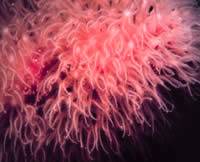In the same way that forests do, coral reefs provide important habitat and shelter for other organisms. The corals themselves are colonies of tiny animals, known as polyps. The reef is actually the skeletons built up by the polyps. In some places, such as the Niagara Escarpment, enormous deposits of limestone have been left behind by ancient corals.
Usually, there are also algae (plants) co-habiting with the coral which use photosynthesis to produce food which is shared with the coral. The corals can also capture plankton using tentacles.

Source: NOAA's National Centers for Coastal Ocean Science
![[home]](gsbann.gif)